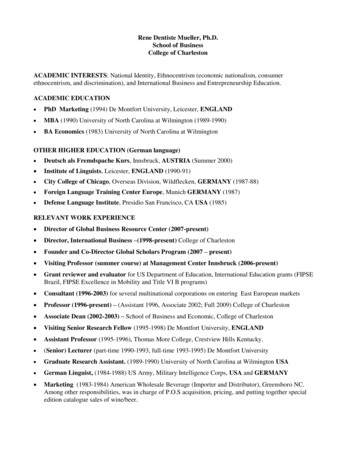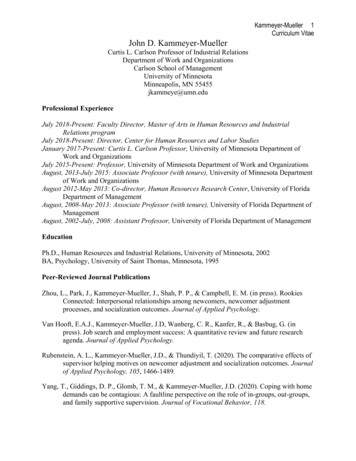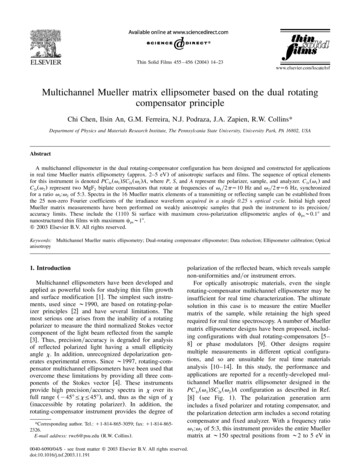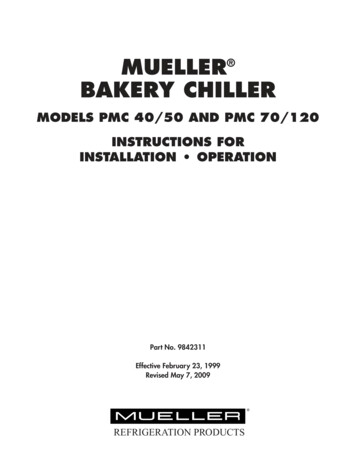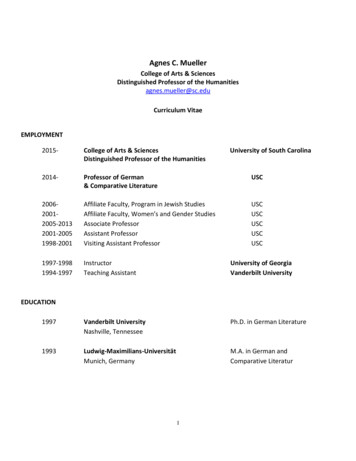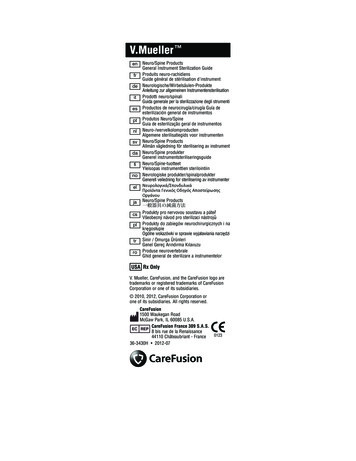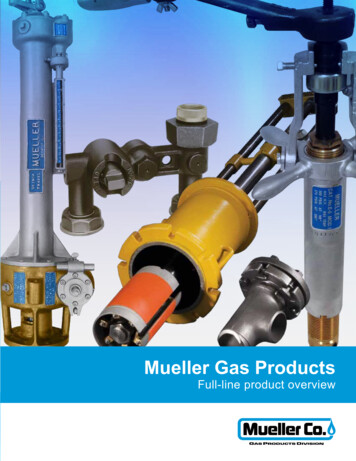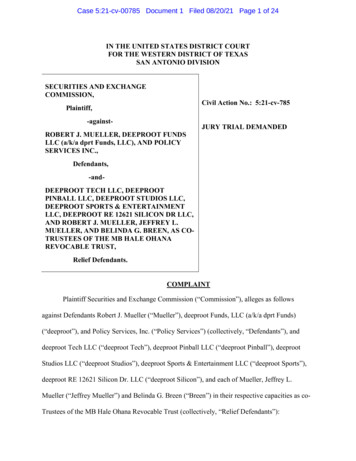
Transcription
Case 5:21-cv-00785 Document 1 Filed 08/20/21 Page 1 of 24IN THE UNITED STATES DISTRICT COURTFOR THE WESTERN DISTRICT OF TEXASSAN ANTONIO DIVISIONSECURITIES AND EXCHANGECOMMISSION,Civil Action No.: 5:21-cv-785Plaintiff,-againstROBERT J. MUELLER, DEEPROOT FUNDSLLC (a/k/a dprt Funds, LLC), AND POLICYSERVICES INC.,JURY TRIAL DEMANDEDDefendants,-andDEEPROOT TECH LLC, DEEPROOTPINBALL LLC, DEEPROOT STUDIOS LLC,DEEPROOT SPORTS & ENTERTAINMENTLLC, DEEPROOT RE 12621 SILICON DR LLC,AND ROBERT J. MUELLER, JEFFREY L.MUELLER, AND BELINDA G. BREEN, AS COTRUSTEES OF THE MB HALE OHANAREVOCABLE TRUST,Relief Defendants.COMPLAINTPlaintiff Securities and Exchange Commission (“Commission”), alleges as followsagainst Defendants Robert J. Mueller (“Mueller”), deeproot Funds, LLC (a/k/a dprt Funds)(“deeproot”), and Policy Services, Inc. (“Policy Services”) (collectively, “Defendants”), anddeeproot Tech LLC (“deeproot Tech”), deeproot Pinball LLC (“deeproot Pinball”), deeprootStudios LLC (“deeproot Studios”), deeproot Sports & Entertainment LLC (“deeproot Sports”),deeproot RE 12621 Silicon Dr. LLC (“deeproot Silicon”), and each of Mueller, Jeffrey L.Mueller (“Jeffrey Mueller”) and Belinda G. Breen (“Breen”) in their respective capacities as coTrustees of the MB Hale Ohana Revocable Trust (collectively, “Relief Defendants”):
Case 5:21-cv-00785 Document 1 Filed 08/20/21 Page 2 of 24SUMMARY1.From at least September 2015 to at least February 2021, Robert J. Mueller anddeeproot, both investment advisers, defrauded two investment funds they advise and nearly 300people who invested roughly 58 million in the funds.2.Mueller and deeproot were investment advisers to two pooled investment fundsthat Mueller created in 2014, the deeproot 575 Fund, LLC (the “575 Fund”) and the deeprootGrowth Runs Deep Fund, LLC (the “dGRD Fund”) (collectively, “the Funds”). Mueller anddeeproot persuaded investors, many of whom were retirees, to cash out annuities and individualretirement accounts they held with other investment companies and invest in the Funds. Muellerand deeproot told investors the Funds would invest in life insurance policies and deeproot-relatedbusinesses to provide relatively safe returns to investors.3.For the 575 Fund, investors committed their principal investment for five yearsand elected to receive either simple annual interest of 7% per year paid out in a lump sum at theend of the five-year term, or 5% simple annual interest paid out in monthly installments for eachof five years (thus, the “5-7-5” in the fund’s name). For the dGRD fund, investors committedtheir principal investment for an undetermined time and were promised that they could receive apotentially larger payout upon the maturity of a life policy investment and based on a complex,first-in, first-out redemption process at an unspecified future point in time.4.Mueller and deeproot told investors that the 575 Fund would invest “the simplemajority of our Fund Assets” in life insurance policies. Though not disclosed until 2019, the 575Fund purchased interests in life insurance policies indirectly, by investing in the dGRD Fund,which itself would invest “the majority of our Fund Assets” in life insurance policies purchasedfor the Funds by Mueller’s other company, Defendant Policy Services. Mueller and deeproot also
Case 5:21-cv-00785 Document 1 Filed 08/20/21 Page 3 of 24told investors that the 575 Fund would use “less than fifty percent (50%) of the asset portfolio” tomake “capital acquisition[s]” in affiliated businesses, including the Relief Defendants.5.While Defendants raised more than 58 million from investors in the 575 Fundand the dGRD Fund, they commingled the money in deeproot and Policy Services bank accountsand spent less than 10 million to purchase life insurance policies for the Funds. They alsopurported to include life insurance policies as assets of the Funds that Mueller and PolicyServices had purchased for Mueller’s earlier investment funds. Notably, Defendants purchasedno new insurance policies for the Funds after September 2017, despite raising approximately 43million for the Funds after that time.6.Defendants used the vast majority of the Funds’ assets – virtually all of which camefrom investors in the 575 Fund and the dGRD Fund – like a piggy bank to fund Mueller’sdeeproot-affiliated businesses, the Relief Defendants. Indeed, Mueller funneled more than 30million of the Funds’ assets to the Relief Defendants in non-arms-length transactions whenever hedetermined the Relief Defendant businesses had expenses that needed to be paid, and he did sowithout any analysis as to whether such transfers constituted suitable investments for his clientFunds. Further, Mueller made these transfers to Relief Defendants without obtaining anything ofsubstance in return for the Funds and without memorializing the transactions in any way.7.Since 2015, neither the life insurance policies nor the “capital” investments inaffiliated businesses have yielded significant revenue or cash flow for Defendants or the Funds.This caused Mueller and Policy Services to default on the purchase of one 10 million face valuelife insurance policy, losing nearly 3.5 million of the Funds’ money in the process. It also causedMueller and deeproot to make more than 820,000 of Ponzi-like payments to earlier investors inthe Funds using money raised from new investors, and make at least 177,000 in payments frommoney borrowed on a short-term basis using the life insurance policies as collateral.3
Case 5:21-cv-00785 Document 1 Filed 08/20/21 Page 4 of 248.Despite making statements suggesting he took no compensation from the Funds,Mueller commingled assets of the Funds in deeproot and Policy Services bank accounts and usedthem to make ad hoc salary payments to himself whenever investor money was available,totaling roughly 1.6 million from 2016 through 2020.9.Mueller also used more than 1.5 million of the Funds’ assets to pay hundreds ofpersonal expenses, including his daughter’s private school tuition, vacations with his family, hissecond wedding, his second divorce, his third wedding, jewelry for both his second and thirdwives (including engagement rings and wedding bands for both wives), other lifestyle spendingfor and by his family, and to buy a condominium in Kauai, Hawaii. When asked by SEC counselduring investigative testimony about his use of the Funds’ assets to pay for these personal andfamily expenses, Mueller asserted his Fifth Amendment right against self-incrimination.10.As alleged in this Complaint, Defendants directly or indirectly employed a device,scheme, or artifice to defraud, made untrue statements of material fact or material omissions, andengaged in acts, practices, or courses of business which operate or would operate as a fraud ordeceit, in connection with the purchase or sale of securities, and in the offer and sale of securities.As a result, Mueller and deeproot violated Sections 17(a)(1)-(3) of the Securities Act of 1933(“Securities Act”) [15 U.S.C. § 77q(a)], Section 10(b) of the Securities Exchange Act of 1934(“Exchange Act”) [15 U.S.C. § 78j(b)] and Rules 10b-5(a)-(c) thereunder [17 C.F.R. § 240.10b-5].Likewise, Policy Services, acting by and through Mueller, violated Sections 17(a)(1) and (3) of theSecurities Act and Section 10(b) of the Exchange Act and Rules 10b-5(a) and (c) thereunder.11.As alleged in this Complaint, Defendants Mueller and deeproot, both investmentadvisers, directly or indirectly employed a device, scheme, or artifice to defraud clients orprospective clients; engaged in transactions, practices, or courses of business which operated as afraud or deceit upon clients or prospective clients; and otherwise engaged in acts, practices, or a4
Case 5:21-cv-00785 Document 1 Filed 08/20/21 Page 5 of 24course of business which were fraudulent, deceptive, or manipulative. Accordingly, DefendantsMueller and deeproot violated Sections 206(1), (2), and (4) of the Investment Advisers Act of 1940(“Advisers Act”) [15 U.S.C. § 80b-6] and Rule 206(4)-8 thereunder [17 C.F.R. § 275.206(4)-8].12.Because the Relief Defendants received proceeds of Defendants’ fraudulentconduct without providing consideration in exchange, they have no legitimate claim to suchmoney. Accordingly, Relief Defendants were unjustly enriched and must disgorge their ill-gottengains resulting from Defendants’ violations.JURISDICTION AND VENUE13.This case involves the offer and sale of limited liability company membershipinterests in the Funds. These membership interests are investment contracts, which are securitiesunder Section 2(a)(1) of the Securities Act [15 U.S.C. § 77b] and Section 3(a)(10) of theExchange Act [15 U.S.C. § 78c]. In addition, Mueller and deeproot are investment advisers to theFunds because, for compensation, they engaged in the business of advising them as to the value ofsecurities or the advisability of investing in, purchasing, or selling securities. Thus, this Court hasjurisdiction over this action under Sections 20(d) and 22(a) of the Securities Act [15 U.S.C. §77t(d) and 77v(a)], Sections 21(d), 21(e) and 27 of the Securities Exchange Act [15 U.S.C. §78u(d), 78u(e) and 78(aa)], and Section 214(a) of the Advisers Act [15 U.S.C. § 808b-14(a)].14.Moreover, Defendants, directly and indirectly, made use of the mails or of themeans and instrumentalities of interstate commerce in connection with the transactions, acts,practices, and courses of business described in this Complaint. Specifically, among others,Defendants communicated with investors by email and the internet, and they received funds frominvestors by wire transfer and remitted Ponzi-like “interest payments” by wire transfer.15.Venue is proper in this District because the Defendants and Relief Defendantsreside in, and a substantial part of the events and omissions giving rise to the claims occurred in,5
Case 5:21-cv-00785 Document 1 Filed 08/20/21 Page 6 of 24the Western District of Texas, San Antonio Division, including but not limited to the Defendants’sales of securities, misrepresentations, acts, practices, transactions, and courses of business.DEFENDANTS16.Robert J. Mueller, age 46, is a natural person residing in San Antonio, Texas. Hegraduated from law school in 2000, and is a current member of the State Bar of Texas. At allrelevant times, Mueller was an “investment adviser” within the meaning of Section 202(a)(11) ofthe Advisers Act [15 U.S.C. § 80b-2(a)(11)] because he was in the business of providing investmentadvice to clients about securities in exchange for compensation, and he also owned and exclusivelymanaged and controlled deeproot, which was the investment advisor to the 575 Fund and the dGRDFund. In fact, Mueller is the principal and exclusive control person of all of the deeproot entities,including all of the Defendants and deeproot-affiliated Relief Defendants in this Complaint.17.deeproot Funds LLC (a/k/a dprt Funds, LLC) is a Texas limited liability companyformed by Mueller in 2013 with its principal place of business in San Antonio, Texas. Mueller is theonly officer of deeproot and, indirectly, is the only owner of the company. At all relevant times,deeproot was an “investment adviser” within the meaning of Section 202(a)(11) of the Advisers Act[15 U.S.C. § 80b-2(a)(11)] because it is the investment advisor to the 575 Fund and the dGRD Fund.18.Policy Services Inc. is an “S” corporation that Mueller formed in Nevada in 2012and re-domiciled in Texas in 2016. Its principal place of business is in San Antonio, Texas, andMueller is its sole shareholder. Mueller used Policy Services to purchase and hold life insurancepolicies for and on behalf of the Funds, and used bank accounts in Policy Services’ name, fundedalmost exclusively with assets of the Funds, to pay significant personal expenses he incurred oncredit cards in the names of his other entities.6
Case 5:21-cv-00785 Document 1 Filed 08/20/21 Page 7 of 24RELIEF DEFENDANTS19.deeproot Tech LLC, a wholly-owned subsidiary of Policy Services, is a Texaslimited liability company Mueller formed in March 2015, with its principal place of business inSan Antonio, Texas.20.deeproot Pinball LLC, a wholly-owned subsidiary of deeproot Tech, is a Texaslimited liability company Mueller formed in March 2015, with its principal place of business inSan Antonio, Texas.21.deeproot Studios LLC, a wholly-owned subsidiary of Policy Services, is a Texaslimited liability company Mueller formed in November 2018, with its principal place of businessin San Antonio, Texas.22.deeproot Sports & Entertainment LLC, a wholly-owned subsidiary of PolicyServices, is a Texas limited liability company Mueller formed in April 2017 with its principalplace of business in San Antonio, Texas.23.deeproot RE 12621 Silicon Dr. LLC, a wholly-owned subsidiary of PolicyServices, is a Texas limited liability company formed by Mueller in February 2020 with itsprincipal place of business in San Antonio, Texas.24.Robert J. Mueller, Jeffrey L. Mueller, and Belinda G. Breen, in theircapacities as Co-Trustees of the MB Hale Ohana Revocable Trust (“MBHO Trust”). TheMBHO Trust is a Texas revocable trust formed in November 2016 that received or maintainsproceeds of Defendants’ fraudulent conduct and was used by Mueller to purchase a Kauai,Hawaii condominium with such proceeds.OTHER RELEVANT ENTITIES25.deeproot 575 Fund LLC is a Texas limited liability company that Muellerformed in December 2014, with its principal place of business in San Antonio, Texas. Mueller,7
Case 5:21-cv-00785 Document 1 Filed 08/20/21 Page 8 of 24through and with deeproot, serves as its investment adviser. Neither the 575 Fund nor itssecurities have been registered with the Commission at any point in time.26.deeproot Growth Runs Deep Fund LLC is a Texas limited liability companythat Mueller formed in February 2014, with its principal place of business in San Antonio, Texas.Mueller, through and with deeproot, serves as its investment adviser. Neither the dGRD Fundnor its securities have been registered with the Commission at any point in time.FACTSI.Mueller and deeproot Created, Solicited Investments in, and Served as InvestmentAdvisers to the Funds27.Mueller and deeproot formed the dGRD Fund and the 575 Fund as Texas limitedliability companies in February 2014 and December 2014, respectively.28.Mueller had exclusive authority and control over the drafting and dissemination of theprivate placement memoranda (“PPMs”) as well as other marketing materials for both of the Funds.29.Although there were multiple versions of the PPMs for both Funds, as a generalmatter, all versions of the PPMs for both Funds disclosed, among other things: (i) the investmentstrategy and investors’ expected returns for both of the Funds; and (ii) that Mueller and deeproothad exclusive control over, and responsibility for, managing the Funds and their investments.30.As described in the PPMs for both Funds, the investment strategy involved a plan topurchase life insurance policies that insured the lives of people who were not affiliated withMueller or any of his businesses and who had sold their policies for cash settlements while stillalive. By purchasing these policies, the Funds would be entitled to the death benefit of thepurchased policies upon maturity – i.e., the face value of the policy upon the death of the insured.At all times, the PPMs stated that Mueller and deeproot would invest a majority of the Funds’assets in life insurance policies. Although not disclosed in the 575 Fund’s PPM until 2019,8
Case 5:21-cv-00785 Document 1 Filed 08/20/21 Page 9 of 24according to Mueller, the 575 Fund never held any interests in life policies directly, but ratherpurchased securities issued by the dGRD Fund, which in turn owned the life policies.31.All versions of the PPM for the 575 Fund, and some versions of the PPM for thedGRD Fund, disclosed that the Funds, at Mueller and deeproot’s discretion and direction, alsocould make “capital acquisition[s]” (i.e., investments) in deeproot-affiliated businesses. Some of thePPMs specifically named several of the Relief Defendants as affiliates that could receive moneyfrom the Funds: e.g., deeproot Tech, deeproot Pinball, deeproot Studios, and deeproot Sports.32.Mueller and deeproot told investors that the Funds’ investments in the affiliatedentities would provide more safety to the Funds’ investment portfolios as well as on-goingrevenue until the life insurance policy investments matured and death benefits were collected. Inthe 2019 version of the 575 Fund, for example, investors were told that these affiliateinvestments, ostensibly, would “i) [] provide short term liquidity; ii) [] provide liquid revenue ordistributions to pay off positions sooner and more frequently than waiting on life policymaturities; and iii) [be] safer diversification of underlying assets away from just life policies.”33.The PPMs did not uniformly describe how the Funds would invest in thedeeproot-affiliated businesses or what the Funds would receive in exchange for suchinvestments. The 2015 and 2019 versions of the PPM for the 575 Fund, and the August 2015version of the PPM for the dGRD Fund, for example, describe the investments as “a purchase ofan internal, affiliated investment position in another enterprise.” The September 2015 version ofthe PPM for the dGRD Fund, however, describes a specific investment in deeproot Tech and its“sole project,” deeproot Pinball, in exchange for Class B Shares of deeproot Pinball.34.Regardless of the language applicable at any given time, in practice, the Fundsnever actually received any ownership or other interests in return for the significant assets of theFunds that Mueller and deeproot funneled to the Relief Defendants. Instead, as explained further9
Case 5:21-cv-00785 Document 1 Filed 08/20/21 Page 10 of 24below, Mueller and deeproot used the Funds’ assets as a piggy bank of available cash to fund theRelief Defendants’ ongoing operations whenever expenses arose.35.The PPMs also describe the ways in which investors in either of the Funds wouldobtain investment returns, including certain repayment options ostensibly designed to provideinvestors with a reliable stream of monthly income. The PPM for the 575 Fund provides that, inaddition to receiving a return of their investment principal after five years, investors have theoption of either a “deferred” seven percent lump sum annual return or a “periodic” five percentmonthly return.36.Specifically, 575 Fund investors choosing the deferred option (“575D”) wouldreceive annual interest of seven percent of their investment principal, non-compounded, paid in alump sum at the end of five years. Those persons choosing the periodic option (“575P”) wouldreceive a return equal to an annual, non-compounded five percent of their investment principal,paid in monthly installments over the course of the five years that their principal was committed.37.Mueller and deeproot marketed the 575P option as providing steady and relativelylarge “interest” income to persons in retirement, which Mueller and deeproot appear to haveclassified as “dividends” at the time the returns actually were paid to investors. About 45% of575 Fund investors chose this periodic return option.38.The dGRD Fund operated differently. Mueller and deeproot marketed the dGRDFund as providing a predetermined rate of return on the life policy investments they referred toas the “liquidation multiplier.” For example, in 2019, the liquidation multiplier was set at 52.5%for investment amounts under 750,000 and 65% for amounts over 750,000, meaning a 500,000 investment would be worth 762,500 at the time of liquidation whereas a 1,000,000investment would be worth 1,650,000. This return and the original principal would be paid todGRD Fund investors in a lump sum in the sequential order in which they invested, at10
Case 5:21-cv-00785 Document 1 Filed 08/20/21 Page 11 of 24unspecified times upon the dGRD Fund’s receipt of sufficient profits from a pool of “matured”life insurance policies.39.The 2019 versions of the PPMs for both Funds included a section titled “Principals& Advisors,” which stated “[t]here is only one director and executive officer of the Company:Robert J. Mueller.” These sections in the 2019 versions of the PPMs are identical – indeed,presumably because Mueller simply cut-and-pasted it, the 575 Fund’s PPM mistakenly refers tothe “dGRD Fund” – and leave no doubt as to Mueller’s total control over the Funds sinceinception, or how he would be paid by Policy Services for his advisory services to the Funds:Mr. Mueller is responsible for deeproot’s product design, marketing, and strategicplanning areas, as well as operation and management of multiple entities. Robertis the architect and implementer of all products, services, or designs PolicyServices, Inc. or the deeproot family of companies have marketed or sold. He hasalso personally managed all aspects of the administrative functions of theenterprises, supervised all investor or client care, handled most of the clerical andprocessing of investor or client paperwork, designed the IT systems and clientportal, and is chiefly responsible for the growth and success of all the enterprises.Robert also has backgrounds in accounting, valuation, information technology,graphic design, marketing, programming, and other technical areas.Robert J. Mueller is the only executive of the Company. He receives no directcompensation from the dGRD Fund. Robert is paid a salary from the UltimateParent [Policy Services] for all services provided across all the entities. Neither he,nor any other executive or personnel serving or employed from the Ultimate Parent[Policy Services] downwards, may earn a commission on any Preferred SharesSold. Any marketing or travel expenses on behalf of the dGRD Fund will beexpensed by invoice.40.This was not the only time Mueller cited to Policy Services in the 2019 versionsof the PPMs for both Funds in an effort to convince investors that their assets would be safe inhis care. In describing some of the risk factors associated with investing in life insurancepolicies, Mueller claimed that his use of Policy Services mitigated some of this risk: “[B]y usingour ultimate parent company, [Policy Services], as our sole affiliated policy administrationprovider between us and the insurance carrier, we are unable to ‘raid the piggy bank’.”11
Case 5:21-cv-00785 Document 1 Filed 08/20/21 Page 12 of 24(emphasis added). Thus, Mueller falsely informed investors and prospective investors thatdeeproot and Policy Services were structured to minimize the opportunity for very kind of fraudthat was actually then occurring.41.From September 2015 to at least February 2021, Mueller and deeproot raised over 58 million from investors in both Funds as follows:No. ofInvestorsSeptember2015 toSeptember2017FundAmountInvestedSeptember2015 toSeptember2017No. ofInvestorsOctober2017 toFebruary2021AmountInvestedOctober 2017to February2021TotalInvestedThe 575 Fund38 7,512,934177 38,662,612 46,175,546The dGRDFund54 8,335,36927 4,278,844 12,614,21342.As contemplated in the PPMs, Mueller and deeproot served as the investmentadviser to the Funds in managing these assets. Mueller, and thus deeproot, devised theinvestment strategy on behalf of both Funds, analyzed and made the investments, determined thecontent of communications to prospective and actual investors, and exclusively controlled thebank accounts, investments, and other assets of the Funds.IV.Mueller and deeproot Used New Investor Money to Make Ponzi-like Payments toEarlier Investors in the Funds43.Since the first investor joined the Funds in 2015, the Funds’ life insuranceportfolio and the deeproot-affiliated business ventures have yielded less than 1.9 million in totalrevenues, before even accounting for costs, to the Funds. Yet, during this same period, Muellerand deeproot paid over 2.8 million in monthly “returns” to the 575P investors.12
Case 5:21-cv-00785 Document 1 Filed 08/20/21 Page 13 of 2444.Bank account records show that at least 820,000 of 575P payments were made toexisting investors from money raised from new investor contributions to the Funds, and at least 177,000 being paid from funds that Mueller borrowed on a short-term basis from third partiesusing assets of the Funds as collateral.45.Nothing in the Funds’ PPMs or other offering documents would lead reasonableinvestors in the Funds to expect that 575P payments to investors, or any other payments to theFunds’ investors, would be made using money received from new investors in the Funds.46.Nothing in the Funds’ PPMs or other offering documents would lead reasonableinvestors in the Funds to expect that 575P payments to investors, or any other payments to theFunds’ investors, would be made using borrowed money.47.Nothing in the Funds’ PPMs or other offering documents would lead reasonableinvestors in the Funds to expect that Mueller or deeproot would use assets of the Funds ascollateral on loans to raise money to make payments to investors.48.Mueller engaged in this activity despite knowing that paying earlier investors withnew investors’ money is a fraudulent Ponzi-like scheme, which he knew from studying a wellpublicized Ponzi scheme lawsuit involving investments in life insurance policies.49.In or around March 2020, Mueller drafted and issued a document to investors thathe titled “deeproot Family of Companies - Investment Portfolio Narrative 2020.B2.” In a sectionof the document describing the pinball venture, Mueller described why he focused oninvestments – like deeproot Pinball – instead of just life policies, writing: “The downfall ofthese companies (and strategy) wasn’t really because of the life policies themselves. It insteadwas due to the company’s CHOICE of how to deal with the weaknesses. In nearly every case,the company chose to LEVERAGE (i.e., either borrow capital at high rates on the openmarketing [sic], or Ponzi-scheme proceeds) against future maturities.” (all caps in original.)13
Case 5:21-cv-00785 Document 1 Filed 08/20/21 Page 14 of 24Despite these statements, Mueller was doing exactly what he railed against other companies fordoing – making Ponzi-like payments and borrowing money in order to pay “returns” to investors.50.When the Funds failed to receive new investor capital between August andNovember 2020, and with no other revenue coming in to the Funds from the life insurance policysettlements or the affiliated businesses, Mueller and deeproot failed for two months to paymonthly “returns” to most of his 575P investors.51.On August 22, 2020, Mueller authored a personal letter to 575P investors – butnot the 575D or dGRD investors – claiming that the COVID-19 pandemic “has caused somedisruptions to cash flow” and stating, “we try to keep adequate reserves for things like this.”52.On September 30, 2020, Mueller sent a similar letter to the 575P investors – and,again, to neither the 575D or dGRD investors – citing the COVID-19 pandemic and blaming“cash flow delays in mid to late September” for having “depleted our 575P payment reserves.”In reality, bank account records show that neither the Funds nor any of the Defendants had evermaintained cash reserves for the payment of 575P investor returns or for any other purpose.53.On November 30, 2020, Mueller resumed monthly payments to 575P investors,not with profits from the Funds’ investments, because there were none, but with proceeds fromloans that he obtained from third parties using assets of the Funds as collateral.V.Mueller and deeproot Funneled Millions of Dollars of the Funds’ Assets to Financethe Relief Defendants’ Operations54.Despite telling the Funds’ investors through the PPMs that both Funds wouldinvest primarily in life insurance policies, Mueller and deeproot have not purchased a single lifeinsurance policy since at least September 2017. Since that time, however, they have raisedapproximately 43 million from 575 Fund and dGRD Fund investors and diverted the majority14
Case 5:21-cv-00785 Document 1 Filed 08/20/21 Page 15 of 24of it to the Relief Defendants and Mueller’s own pockets, contravening the investment allocationstrategy of the Funds presented to investors.55.Indeed, Mueller spent virtually every dollar he ever obtained from investors, andhe often paid business expenses for the Relief Defendants on credit cards in advance, onlypaying those bills later after receiving new investor funds. In doing so, Mueller and deeprootbreached the fiduciary duties they owed to the Funds in that they did not conduct, or documentthat they conducted, any analysis in advance of each transfer to determine whether theseexpenditures were a good or appropriate investment for his client Funds. Rather, despite theirfiduciary obligations, Mueller and deeproot made their ad hoc “investment” decisions based onwhat was best for Mueller and the Relief Defendants at that moment.56.Moreover, other than relying on bank records after the fact, Mueller and deeprootdid not document these purported investments as they occurred. To this day, despite Muellerpouring tens of millions of the Funds’ (and thus investors’) dollars into these businesses, theFunds have no documented ownership or other interest in any of the deeproot-affiliated entities.57.Reasonable investors would consider it important to their investment decisionsthat Defendants were not acquiring life insurance policies as promised in the PPMs and wereinstead solely funneling investor money into providing cash flow for Mueller and his deeprootaffiliated businesses.58.Reasonable investors would consider it important to their investment decisionsthat Defendants, in breach of their fiduciary duties, did not conduct, nor document that theyconducted, any analysis to determine if the transfers of the Funds’ assets to Relief Defendantswere suitable investments for client Funds.15
Case 5:21-cv-007
robert j. mueller, deeproot funds llc (a/k/a dprt funds, llc), and policy services inc., defendants, -and- deeproot tech llc, deeproot pinball llc, deeproot studios llc, deeproot sports & entertainment llc, deeproot re 12621 silicon dr llc, and robert j. mueller, jeffrey l. mueller, and belinda g. breen, as co-trustees of the mb hale ohana
